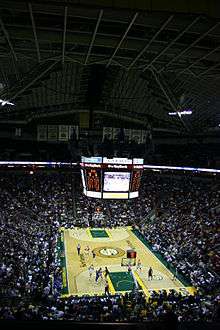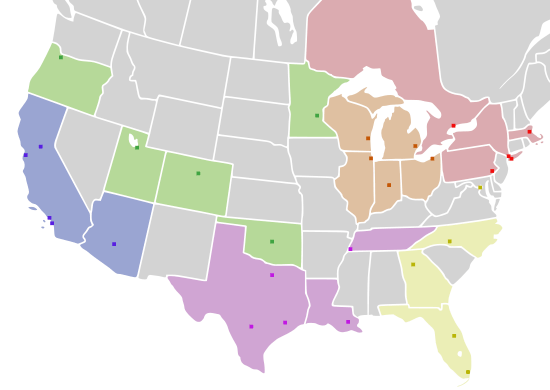Expansion of the National Basketball Association
The expansion of the National Basketball Association has happened several times in the league's history since it began play in 1946. Some of the most recent examples of the expansion of the NBA are the Charlotte Hornets in 1988, Miami Heat in 1989, Vancouver Grizzlies in 1995 (who later relocated to Memphis in 2001), and New Orleans Pelicans in 2002.[1]
The fewest number of teams the NBA has ever had was 8 teams in both 1947–48 and 1955–56.
| Progression of NBA Expansion | |
|---|---|
| Years | # of Teams |
| 1946–1947 | 11 |
| 1947–1948 | 8 |
| 1948–1949 | 12 |
| 1949–1950 | 17 |
| 1950–1951 | 11 |
| 1951–1953 | 10 |
| 1953–1955 | 9 |
| 1955–1961 | 8 |
| 1961–1966 | 9 |
| 1966–1967 | 10 |
| 1967–1968 | 12 |
| 1968–1970 | 14 |
| 1970–1974 | 17 |
| 1974–1976 | 18 |
| 1976–1980 | 22 |
| 1980–1988 | 23 |
| 1988–1989 | 25 |
| 1989–1995 | 27 |
| 1995–2004 | 29 |
| 2004–present | 30 |
Early years: 1946–1966
There was a lot of expansion and moving of organizations in the early years of the NBA. During this twenty year time period is when notable franchises entered the NBA like the Syracuse Nationals (now the Philadelphia 76ers), the Philadelphia Warriors (now the Golden State Warriors), Baltimore Bullets (now the Washington Wizards) and Rochester Royals (now the Sacramento Kings).
During this time period the league experienced its first substantial growth, although it was short-lived, as the league was back down to 9 teams by 1966.
Later years: 1966–1980
During this time period most of the current teams were brought into the league, including the Chicago Bulls, Houston Rockets, Seattle SuperSonics (now Oklahoma City Thunder), Phoenix Suns, Milwaukee Bucks, Los Angeles Clippers, Portland Trail Blazers, Cleveland Cavaliers, New Orleans Jazz (now Utah Jazz), San Antonio Spurs, Denver Nuggets, New Jersey Nets (now Brooklyn Nets), Indiana Pacers and Dallas Mavericks were introduced.
Modern expansion: 1980–present
During this time period 7 new NBA franchises were formed, Charlotte Hornets, Miami Heat, Orlando Magic, Minnesota Timberwolves, Toronto Raptors, Vancouver Grizzlies (now Memphis Grizzlies) and New Orleans Pelicans. The league saw a rise of five teams in 15 years making a total of 30 teams.
Team timeline
See Timeline for the history of teams who participated in the NBA.
Possible expansion cities

Seattle
Seattle previously hosted the Seattle SuperSonics from 1967 to 2008, prior to the relocation to Oklahoma City, and is a leading candidate to host a potential expansion NBA team.[2]
It was reported in 2013 that the Sacramento Kings were close to moving their franchise to Seattle, but the NBA Board of Governors voted against relocation, thus ensuring that the Kings would remain in Sacramento.[3]
As of 2018, the only statements that have been made about the NBA returning to Seattle would be through expansion.[4][2]
Louisville
Louisville, Kentucky has two basketball arenas suitable for major league play: the KFC Yum! Center, which holds 22,090 and currently hosts the Louisville Cardinals, and Freedom Hall, which holds 18,865. Both arenas have hosted well-attended NBA exhibition games.[5][6] In the early 2000s, the city tried unsuccessfully to draw the Houston Rockets (remained in Houston), the Vancouver Grizzlies (moved to Memphis), and the Charlotte Hornets (moved to New Orleans).[7] Louisville has one prior major league basketball team in the Kentucky Colonels, which were a successful franchise during their nine seasons in the American Basketball Association, winning the ABA Finals in 1975 along with winning the most games and highest winning percentage of any franchise in the league's history.
Pittsburgh
Pittsburgh has a new arena, the PPG Paints Arena (which opened in 2010) that holds over 19,000 for basketball. It was rumored for a short time that the Detroit Pistons were moving to Pittsburgh,[8] and Pittsburgh was one of the cities mentioned by David Stern as a possible relocation site.[9] Pittsburgh has a long basketball tradition with Pitt and Duquesne as well as more recently with Robert Morris Colonials, the 1968 ABA champion Pittsburgh Condors, the 1995 CBA finalist Pittsburgh Piranhas, the Pittsburgh Rens of the ABL and the Pittsburgh Ironmen of the BAA.
Kansas City
Kansas City, Missouri is one of the largest media markets without an NBA franchise, and a larger TV market than current NBA cities Oklahoma City and New Orleans. It has previously hosted the Kansas City Kings from 1972 to 1985 until they moved to Sacramento. As does Pittsburgh, it has a more recently built arena, the Sprint Center, that has hosted Big 12 and both the men's and women's NCAA tournaments. The city is also home to the College Basketball Hall of Fame.
Vancouver
The city of Vancouver previously hosted an NBA team (the Vancouver Grizzlies) before it relocated to Memphis, Tennessee in 2001 and became the Memphis Grizzlies. The city has a solid fan base and the city already has a major league team, the Vancouver Canucks. It has Rogers Arena as well as a large population of 2.4 million in the metro area and a large TV market, province-wide.
Mexico City
Since 1992, the NBA Global Games have had NBA games hosted in different places around the world, with Palacio de los Deportes in Mexico City (the capital and most populous city of the country) being one of the venues for hosting preseason games and regular season games, with the arena having a capacity of over 20,000. On December 7, 2017, reports stated that the NBA would put a NBA G League team in the city for next season.[10][11] This was furthered fueled by Commissioner Adam Silver's statement that the NBA has been in discussions to place a G League team in Mexico City as well opening of NBA Academy in that city for Latin American and Caribbean players.[12] None of the four major sports leagues (MLB, NBA, NFL, and NHL) have ever put a major league team in Mexico, although the region is found to more accommodating with its proximity than any attempts for teams in other regions such as Europe.
Teams

The NBA originated in 1946 with 11 teams, and through a sequence of team expansions, reductions, and relocations currently consists of 30 teams. The United States is home to 29 teams and one is located in Canada.
In the following table it shows current NBA teams which were participating in the 2017–18 NBA season, in which the city in which it's located, when the club was founded, joined the NBA, number of time relocated and time the franchises name has changed.
Current
Notes:
- The Charlotte Hornets are regarded as a continuation of the original Charlotte franchise. Because of this, the New Orleans Pelicans are no longer the same franchise as the original Charlotte Hornets. The New Orleans Pelicans were established in 2002. The Charlotte Hornets rejoined the league in 2004, and were known as the Bobcats from 2004 to 2014.
- Spent two seasons as Oklahoma City/New Orleans Hornets due to Hurricane Katrina
Former
| Team | City | Founded | Entered NBA | Years Active | Left NBA | Reason |
|---|---|---|---|---|---|---|
| Anderson Packers | Anderson, IN | 1946 | 1949 | 1 | 1950 | Small market |
| Baltimore Bullets | Baltimore, MD | 1944 | 1947 | 8 | 1954 | — |
| Chicago Stags | Chicago, IL | 1946 | 1946 | 4 | 1950 | — |
| Cleveland Rebels | Cleveland, OH | 1946 | 1946 | 1 | 1947 | — |
See also
References
- ↑ Fischer-Baum, Reuben; Silver, Nate (May 21, 2015). "The Complete History Of The NBA". FiveThirtyEight. Retrieved June 3, 2017.
- 1 2 Prada, Mike (October 25, 2016). "Expansion team to Seattle looking more and more likely". SB Nation. Retrieved June 3, 2017.
- ↑ "Kings to stay in Sacramento as owners reject Seattle move". National Basketball Association. Associated Press. May 15, 2013. Retrieved November 6, 2015.
- ↑ Moore, Matt (October 13, 2016). "With NBA expansion rumored, a look at the pros, cons and prospective cities". CBS Sports. Retrieved June 3, 2017.
- ↑ https://www.bizjournals.com/louisville/news/2014/11/10/nba-could-visit-louisville-again-next-year.html
- ↑ http://www.espn.com/mens-college-basketball/news/story?id=4967977
- ↑ https://www.bizjournals.com/louisville/stories/2004/10/04/story2.html
- ↑ Belko, Mark (February 4, 2010). "Pittsburgh mentioned in Pistons' relocation speculation". Pittsburgh Post-Gazette. Retrieved July 10, 2017.
- ↑ Feigen, Jonathan (February 15, 2013). "Stern sees continued prosperity for NBA". Houston Chronicle. Retrieved July 10, 2017.
- ↑ https://www.nytimes.com/2017/12/07/sports/nba-g-league-mexico-city.html
- ↑ https://www.sbnation.com/2017/12/7/16747368/nba-g-league-team-mexico-city-next-season
- ↑ https://www.nba.com/article/2017/12/07/nba-adam-silver-open-basketball-academy-mexico-city